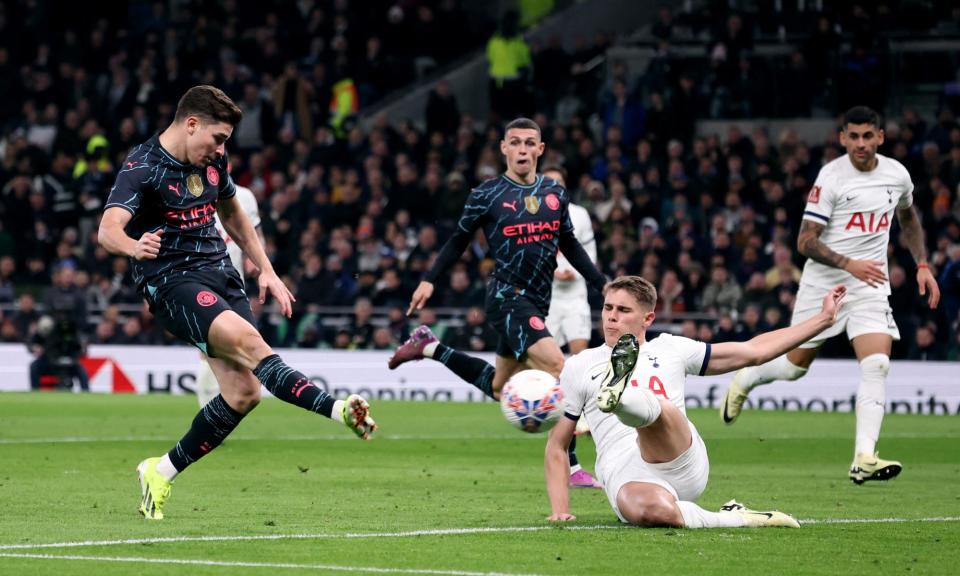Why Manchester City owe their FA Cup run to the power of the collective

By the time 3pm rolls around on Saturday at Wembley, few will be thinking back to how the road to the FA Cup final began for Manchester City. It was a bleak January afternoon at the Etihad Stadium, where Huddersfield were dispatched 5-0 as the Premier League champions showed the gulf between them and a side who ended up being relegated from the Championship.
As it custom, Pep Guardiola used the match to rest senior players, giving opportunities to Stefan Ortega, Oscar Bobb and even the rarely-spotted Sergio Gómez, who was permitted the full 90 minutes of the stroll. Micah Hamilton made his first home appearance and Jacob Wright was afforded a debut in a mix-and-match event.
Related: Bayern Munich close to deal for Vincent Kompany to take over as manager
If City defeat Manchester United and take the long walk up the steps to lift the trophy, there will be a long line of players behind Kyle Walker. Trophies are not won in single matches – they take months of hard work. The final will be City’s sixth match in the competition and it has been a difficult route – following Huddersfield it was all Premier League opposition with Tottenham, Luton, Newcastle and then Chelsea defeated along the way.
Only Ortega, Bobb, Jérémy Doku and Julián Álvarez have featured in all five ties, and none could be described as a regular starter. Twenty-two players have been given action in the Cup and however unremarkable their contribution, it has mattered. Whether it was Ortega’s four clean sheets, Rico Lewis’s assist against Huddersfield or Doku earning the corner that led to Nathan Aké’s late winner at Tottenham in the fourth round, they have made an impact.
Ortega’s performances have gained the most attention across a season when he has become the most reliable – and called-upon – deputy keeper in English football. He has saved his team in both league and Cup despite Guardiola admitting he had not heard of his second-choice goalkeeper before signing him. His saves at crucial moments have almost taken some of the gloss off what Ederson has done over the longer term. Ederson’s ego may have been damaged by being put in the shadows somewhat. The Brazilian would not have started at Wembley regardless of his fractured eye socket. Ortega played last season when United were defeated in the final and with rumours flying about that Ederson could be tempted to move to Saudi Arabia in the summer, he will be eager for another chance to prove his credentials as a potential No 1.
The quarter-final victory over Newcastle was where Doku underlined his quality, providing a constant threat from a more central position. Guardiola moved him inside, maybe as an experiment, to see what he could do away from the wing. There is a degree of chaos whenever Doku is on the ball because his speed and trickery do not always marry together harmoniously but it is rarely dull. He is a player City fans get excited about when he gains possession, even though the end product is somewhat erratic, and Cup outings have helped him to progress.
These are sink or swim occasions for reserves who are thrust into competitive games. Zack Steffen, City’s previous second-choice goalkeeper, played in every round of the 2022 Cup run but then was not seen again after a calamity in the semi-final defeat by Liverpool. Guardiola needs to know whether those at his disposal have the right mental and physical attributes.
Often minutes are accumulated in the cup competitions to keep players in big squads happy but it is also down to them to take advantage of their opportunities. Kalvin Phillips’s chances were not seized and he was shipped off in January to West Ham on loan. His fellow central midfielder Matheus Nunes is aware of the ruthless nature of playing for an elite club but equipped himself well when called upon 18 minutes into the win over Huddersfield and played the full match against Luton. City going out of the Carabao Cup to Newcastle at the first hurdle in September has made this run more important to those on the fringes, but often it has been more a case of chipping in than stealing the limelight.
Guardiola wants to win every competition he enters and minutes are rarely given away: they have to be earned on the training ground and with the right attitude away from it. Hamilton and Wright, for example, have been kept around the first-team squad and were given Champions League debuts in March as reward for their progress.
The strongest XI will play at Wembley but once it is over, 40 medals – whether gold or silver – will be distributed between City players and staff. For Kevin De Bruyne or Bernardo Silva it may be another shiny thing to put in a box but for Ortega, Doku, Gómez, Hamilton and Wright, at least, it will be precious.

